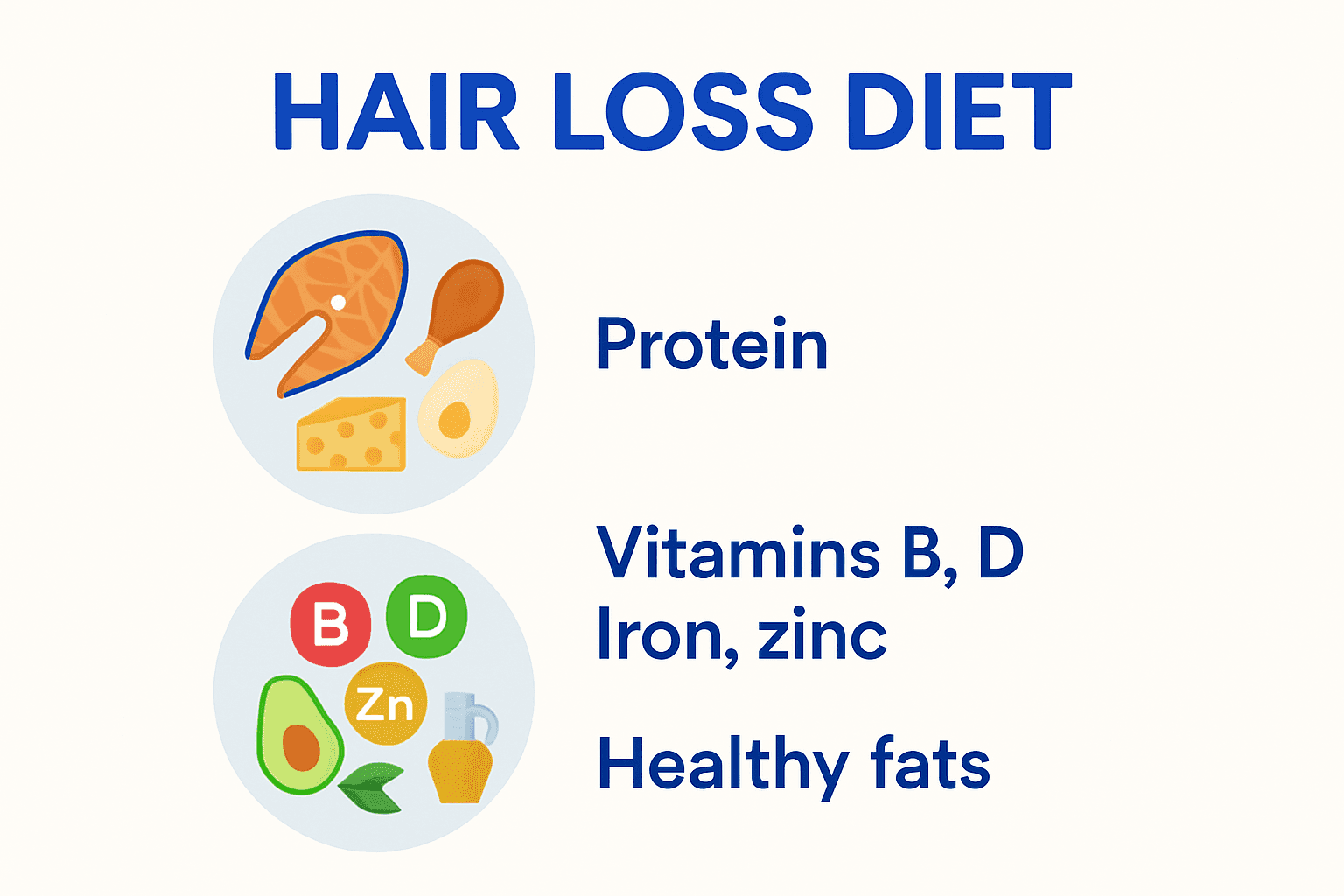Blog
Learning Materials
Hair Loss Diet: Foods and Tips for Stronger Hair in 2025
Updated: July 28, 2025

Hair loss can feel like a never-ending struggle and anyone concerned about thinning strands knows how frustrating it gets. Yet scientists have found that about 30% of hair loss cases are linked to simple dietary mistakes or nutrient gaps. Most people focus on expensive shampoos and miracle tonics without realizing that changing just a few things on their plate could make the biggest difference. What if the key to thicker, stronger hair in 2025 starts at your next meal?
Table of Contents
- Best Foods For A Hair Loss Diet
- Nutrient Deficiencies That Affect Hair Growth
- Common Diet Mistakes Leading To Hair Loss
- How To Track Progress And Personalize Your Diet
Quick Summary
| Takeaway | Explanation |
|---|---|
| Prioritize protein-rich foods | Incorporate lean proteins like chicken, fish, and eggs to strengthen hair and reduce breakage. |
| Address nutrient deficiencies promptly | Monitor levels of iron, zinc, and vitamins B12 and D to prevent hair loss and support growth. |
| Avoid extreme dieting practices | Sudden caloric and protein restrictions can lead to hair loss; maintain a balanced diet instead. |
| Stay hydrated for hair health | Drink sufficient water for optimal nutrient transport to hair follicles and to prevent dryness. |
| Track dietary changes systematically | Keep a detailed food journal and monitor hair health to observe the impact of dietary choices. |
Best Foods for a Hair Loss Diet
Nutrition plays a critical role in maintaining healthy hair growth and preventing hair loss. Your diet serves as the foundation for hair strength, providing essential nutrients that support follicle health and minimize potential hair thinning.

Protein Rich Foods for Hair Restoration
Protein forms the primary building block of hair, making it crucial for hair loss prevention. Lean proteins like chicken, fish, eggs, and legumes contribute directly to hair structure and growth. Amino acids found in these foods help rebuild and strengthen hair follicles, reducing breakage and promoting resilient hair growth.
Eggs stand out as a nutritional powerhouse. They contain biotin, a B vitamin essential for keratin production. According to Healthline, biotin deficiency can lead to significant hair loss, making eggs an excellent dietary addition for individuals experiencing hair thinning.
Essential Nutrients for Hair Health
Beyond protein, specific micronutrients play pivotal roles in hair maintenance. Iron, zinc, and vitamins A, C, and D are fundamental in supporting hair follicle function. Leafy green vegetables, shellfish, and fatty fish like salmon provide comprehensive nutritional support. The Trichological Society recommends consuming beans, lentils, and oysters to ensure adequate mineral intake.
Vitamin deficiencies can directly impact hair growth. For instance, vitamin B12 and D insufficiencies are linked to increased hair shedding. Incorporating fortified dairy products, eggs, and seafood can help mitigate these nutritional gaps.
Strategic Dietary Approach for Hair Loss Prevention
Creating a balanced diet involves more than just consuming individual nutrients. Hydration, portion control, and diverse food selections contribute to overall hair health. Aim for a diet rich in whole grains, lean proteins, fruits, and vegetables. Omega-3 fatty acids from sources like salmon and walnuts can reduce inflammation and support scalp health.
Consistent nutrition is key. Sudden dietary changes or extreme restrictions can shock your system and potentially accelerate hair loss. Gradual, sustainable dietary modifications yield better long-term results. Learn more about personalized hair growth strategies.
Remember that while diet significantly influences hair health, individual factors like genetics, stress, and underlying medical conditions also play crucial roles. Consulting healthcare professionals can provide personalized insights tailored to your specific hair loss concerns.
Below is a summary table highlighting essential nutrients for hair health, their main functions, and examples of food sources mentioned in this section:
| Nutrient | Main Function for Hair | Key Food Sources |
|---|---|---|
| Protein | Builds keratin, strengthens hair structure | Chicken, fish, eggs, legumes |
| Biotin (B7) | Aids keratin production, prevents hair loss | Eggs, legumes |
| Iron | Supports follicle growth cycle | Leafy greens, beans, lentils, shellfish |
| Zinc | Maintains hair follicle health | Oysters, shellfish, beans, lentils |
| Vitamin D | Maintains hair follicle health | Salmon, fortified dairy, eggs, seafood |
| Vitamin B12 | Supports keratin production | Eggs, fortified dairy, seafood |
| Omega-3 Fatty Acids | Reduces inflammation, supports scalp health | Salmon, walnuts |
Nutrient Deficiencies That Affect Hair Growth
Nutrient deficiencies can significantly disrupt hair growth mechanisms, causing unexpected hair loss and compromising overall hair health. Understanding these nutritional gaps becomes crucial for individuals experiencing unexplained hair thinning or reduced hair quality.
Critical Micronutrients and Hair Loss
Research from the Dermatology and Therapy journal reveals that specific nutrient deficiencies directly impact hair follicle function. Iron, zinc, biotin, and vitamin D emerge as key micronutrients whose insufficient levels can trigger hair loss.
Iron deficiency represents a particularly significant concern. According to the National Institutes of Health Office of Dietary Supplements, iron insufficiency is a well-established cause of hair loss, especially among women. When iron levels drop, hair follicles struggle to maintain their growth cycle, leading to increased shedding and reduced hair density.
Vitamin Deficiencies and Follicle Health
Vitamin deficiencies play a complex role in hair growth disruption. Harvard T.H. Chan School of Public Health highlights vitamin D's critical function in maintaining healthy hair follicles. Insufficient vitamin D can lead to weakened hair structure and accelerated hair loss.
B-complex vitamins also demonstrate substantial impact. Vitamins B12 and B7 (biotin) are essential for keratin production, the protein that forms hair's primary structure. Deficiencies in these vitamins can result in brittle, thin hair prone to breakage. Symptoms often include not just hair loss but also changes in hair texture and slower growth rates.
Comprehensive Nutritional Assessment

Addressing nutrient deficiencies requires a holistic approach. Blood tests can accurately diagnose specific nutritional gaps, allowing targeted dietary interventions or supplementation. Consulting healthcare professionals helps develop personalized strategies for restoring hair health.
Dietary modifications and strategic supplementation can reverse nutrient-related hair loss. Incorporating diverse, nutrient-rich foods and considering professional guidance becomes essential. Learn about personalized protein treatments for hair growth to complement your nutritional strategy.
Remember that while nutrient deficiencies significantly influence hair health, individual responses vary. Genetic factors, overall health, and lifestyle also contribute to hair growth patterns. Patience and consistent nutritional support are key to achieving healthier, stronger hair.
Common Diet Mistakes Leading to Hair Loss
Diet plays a critical role in maintaining healthy hair, and certain nutritional missteps can significantly contribute to hair loss. Understanding these common dietary errors helps individuals make informed choices about their nutrition and hair health.
Protein and Calorie Restriction Pitfalls
Research published in nutritional science journals indicates that severe protein and calorie restrictions can trigger dramatic hair loss. When the body experiences significant nutritional stress, it prioritizes essential functions, redirecting nutrients away from hair growth. Extreme dieting or sudden dramatic weight loss can shock the metabolic system, causing telogen effluvium - a condition where hair follicles prematurely enter the resting phase.
Protein is especially crucial. Inadequate protein intake means fewer amino acids are available for keratin production, leading to weaker hair strands prone to breakage. Crash diets and restrictive eating patterns compromise not just overall health but specifically impact hair's structural integrity.
Inflammatory Diet and Nutritional Imbalances
A Johns Hopkins study revealed that high-fat, high-cholesterol diets can trigger hair loss and skin inflammation. Diets rich in processed foods, refined sugars, and unhealthy fats create systemic inflammation, disrupting normal hair growth cycles.
Nutritional imbalances extend beyond macronutrients. Harvard Health emphasizes the importance of B vitamins like thiamin, riboflavin, and biotin in converting food into energy and supporting hair health. Diets lacking these critical nutrients can compromise hair follicle function and overall hair quality.
Dehydration and Micronutrient Deficiency Risks
Often overlooked, dehydration represents a significant dietary mistake affecting hair health. Water is essential for transporting nutrients to hair follicles and maintaining cellular functions. Insufficient hydration can lead to dry, brittle hair and potentially accelerate hair loss.
Micronutrient deficiencies compound these risks. Diets lacking essential minerals like zinc, iron, and vitamins A, C, and D create an environment unsuitable for optimal hair growth. Relying on processed foods or maintaining a limited diet increases the likelihood of these critical nutritional gaps.
Consistent, balanced nutrition remains the cornerstone of healthy hair. Explore our personalized nutrition strategies to develop a comprehensive approach to hair health.
Remember that dietary mistakes are reversible. Gradual, sustainable dietary modifications and professional nutritional guidance can help restore hair strength and vitality. Individual responses vary, so patience and consistent nutritional support are key to achieving healthier hair.
To help clarify the main dietary mistakes that can lead to hair loss, here’s a comparison table summarizing each mistake, its explanation, and reported effects on hair health from the section above:
| Diet Mistake | What It Involves | Reported Effects on Hair Health |
|---|---|---|
| Severe protein/calorie restriction | Crash diets, dramatic weight loss, restrictive eating | Rapid hair loss, weakened hair, breakage |
| High-fat/inflammatory diet | Diets rich in processed foods, refined sugar, unhealthy fats | Hair loss, scalp/skin inflammation |
| Inadequate B vitamins | Lacking thiamin, riboflavin, biotin | Compromised follicle function, poor hair quality |
| Dehydration | Not drinking enough water | Dry, brittle hair, possible accelerated loss |
| Micronutrient deficiencies | Low intake of zinc, iron, vitamins A, C, D | Poor growth, thinning, weakened follicles |
How to Track Progress and Personalize Your Diet
Personalizing your diet for hair health requires a strategic approach that combines scientific tracking, professional guidance, and consistent monitoring. Understanding how to effectively measure and adjust your nutritional intake can significantly impact hair growth and overall hair quality.
Comprehensive Nutritional Assessment
Research analyzing hair mineral content demonstrates that dietary habits directly influence mineral levels in hair. A comprehensive nutritional assessment involves multiple tracking methods to understand your unique physiological response.
Blood tests serve as the primary diagnostic tool. These tests can reveal specific nutrient deficiencies, hormonal imbalances, and metabolic factors contributing to hair loss. Key markers include iron levels, vitamin D, B-complex vitamins, zinc, and thyroid function. Working with healthcare professionals helps interpret these results and develop targeted nutritional strategies.
Personalized Tracking and Documentation
Research indicates that identifying nutritional risk factors requires thorough history-taking and systematic documentation. Maintaining a detailed food and hair health journal allows you to track correlations between dietary changes and hair growth.
Documentation should include:
- Daily food intake
- Supplement consumption
- Hair condition observations
- Stress levels
- Sleep quality
- Physical activity
Photographic documentation provides visual evidence of hair progress. Take consistent, well-lit photos from multiple angles every four to six weeks to track changes in hair density, thickness, and overall health.
Advanced Monitoring and Adaptation
Harvard Health emphasizes the importance of B vitamins in maintaining healthy hair. Personalization means continuously adapting your diet based on tracked results. Consider working with a nutritionist who specializes in hair health to develop a tailored nutrition plan.
Advanced tracking methods include:
- Quarterly blood panel reviews
- Professional hair and scalp analysis
- Metabolic health screenings
- Micronutrient profiling
Technology now offers innovative solutions for personalized tracking. Learn about our advanced hair growth monitoring techniques to enhance your understanding of hair health progression.
Remember that hair health is a complex interplay of nutrition, genetics, lifestyle, and overall wellness. Patience, consistency, and a holistic approach are crucial. Regular professional consultations and a commitment to continuous learning will help you develop the most effective personalized diet strategy for optimal hair growth.
Frequently Asked Questions
What foods promote hair growth?
Including protein-rich foods like chicken, fish, and eggs, as well as leafy greens, nuts, and seeds can boost hair strength and reduce loss. Omega-3 fatty acids from sources like salmon and walnuts are also beneficial.
How can nutrient deficiencies lead to hair loss?
Deficiencies in key nutrients such as iron, zinc, and vitamins B12 and D can disrupt the hair growth cycle, leading to increased shedding and weaker hair follicles.
What dietary mistakes should I avoid for healthy hair?
Avoid severe protein and calorie restrictions, high-fat inflammatory diets, and insufficient hydration. These can all contribute to hair thinning and loss.
How can I personalize my diet for better hair health?
Start with a comprehensive nutritional assessment to identify deficiencies. Keep a food and hair health journal to track changes, and consider consulting a nutritionist for tailored dietary strategies.
Ready to Transform Your Hair With Science-Backed Nutrition?
Have you ever wondered if your diet is truly supporting your hair goals? If you are frustrated by slow growth, breakage, or out-of-the-blue thinning, you are not alone. As you learned in this article, even simple nutrition mistakes can quickly stall your progress. But knowing what to eat is only the first step. You need a personalized plan that measures how your food choices actually affect your hair. That is where MyHair.ai comes in.

MyHair.ai uses advanced AI-driven analysis to assess your unique hair health from real photos and data. Just upload your hair scan and see which nutrients you might be missing and which foods work best for you. Track your results over time and get instant, evidence-based product recommendations if you need extra help. Do not guess when it comes to your appearance. Visit MyHair.ai now and start your personalized journey to stronger, healthier hair. Your first step today could lead to your best hair tomorrow. Learn more about how our advanced monitoring techniques support lasting hair growth.